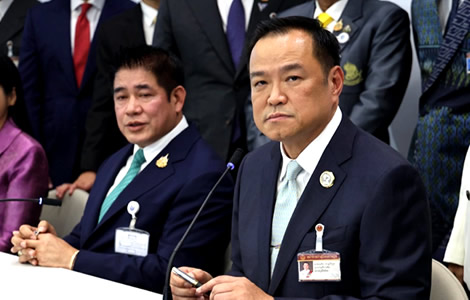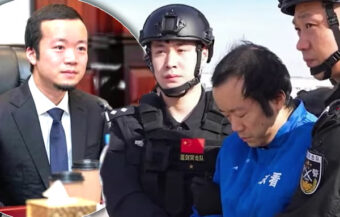People’s Party set to elect Anutin Charnvirakul as PM Friday after the Privy Council blocked caretaker PM Phumtham’s last-ditch bid to dissolve parliament, leaving Pheu Thai in opposition and raising doubts over a short-term government and promised reforms.
A turbulent day in Thai politics has set the stage for Bhumjaithai leader Anutin Charnvirakul to become Prime Minister on Friday. Acting PM Phumtham Wechayachai’s last-ditch attempt to dissolve parliament was slammed down by the Privy Council. Pheu Thai is stranded on the opposition benches but will still push Chaikasem Nitisiri in a symbolic fight. Thailand now faces a likely short-term Anutin-led government promising reform, though scepticism runs high. Critics warn the People’s Party could pay a heavy price for rejecting Pheu Thai, fueling doubts about its motives. For the first time, it now wields national power, replacing a Pheu Thai-led government with a conservative coalition led by a party that has blocked constitutional reform since 2023.

The House of Representatives will convene on Friday to elect a new prime minister under Section 159 of the 2017 Constitution. This was confirmed late Wednesday night by House Speaker Wan Muhamad Noor Matha. The decision follows a failed last-minute attempt by the caretaker government to dissolve parliament.
Earlier in the day, Acting Prime Minister Phumtham Wechayachai submitted a draft royal decree to dissolve the House of Representatives. However, the Privy Council swiftly returned the proposal. It cited procedural non-compliance and legal concerns raised by the Office of the Council of State. This move effectively blocked any chance of an early general election.
The dramatic reversal dealt a blow to Pheu Thai’s strategy. The party had hoped to force a snap election to retain power. But instead, the rejection has cleared the path for a Friday vote in parliament.
People’s Party backs Anutin as Prime Minister. Privy Council blocks Acting PM’s attempt to dissolve House
On Wednesday morning, political tensions rose sharply. The People’s Party, Thailand’s largest parliamentary bloc with 143 MPs, announced it would back Bhumjaithai Party leader Anutin Charnvirakul for prime minister. This announcement was made in a live parliamentary session, stunning many observers.
The party rejected Pheu Thai’s candidate, Chaikasem Nitisiri, a former attorney-general. In addition, he was a minister in former PM Yingluck Shinawatra’s ousted administration in the 2014 coup d’état. This shift in support was seen as a turning point. As a result, Mr. Phumtham sought to dissolve parliament to prevent a rival-led government from taking office. Despite warnings from legal advisers, he submitted the draft decree anyway.
Yet, the Privy Council rejected it swiftly. According to a source at Government House, the Council stated the submission violated presentation rules for royal approval. In particular, it questioned whether a caretaker prime minister had authority to make such a request. Council of State Secretary-General Pakorn Nilprapunt had earlier warned the move would be unconstitutional.
Consequently, the Cabinet Secretariat was instructed to return the draft to Mr. Phumtham, along with a formal rejection letter. That letter clarified that a caretaker government could not dissolve the House under existing laws. It also set a precedent for future cases or political crises.
Pheu Thai accepts defeat as People’s Party demands early elections and clear constitutional reform timeframe
Though some in Pheu Thai argued the dissolution could be justified, the Privy Council’s position was decisive. Mr. Phumtham reportedly accepted the decision. On Monday evening, he refused to answer questions about the matter. Meanwhile, senior members of Pheu Thai began preparing for the party’s new role in opposition.
The collapse of the dissolution plan came just hours after the People’s Party declared its support for Mr. Anutin. Importantly, this support came with several conditions. The People’s Party insisted that any new government must dissolve the House within four months of its first policy statement. It also demanded a binding commitment to hold a general election and a possible constitutional referendum during or before that time.
Political analysts say the terms are designed to limit the government’s mandate and pressure it to seek fresh public approval. Although temporary, the arrangement reflects the volatile nature of Thailand’s political climate. Certainly, Mr. Anutin now appears well-positioned to secure the role of prime minister.
Apart from the 143 votes from the People’s Party, he has the backing of another 146 MPs. These include 68 from Bhumjaithai, 31 from the Kla Tham Party and 17 from Palang Pracharat. Moreover, he enjoys the support of 16 MPs linked to Deputy Commerce Minister Suchart Chomklin and breakaway groups from the United Thai Nation Party.
Anutin appears well-positioned to secure PM role as coalition support passes simple majority threshold
In addition, three Democrat MPs have broken ranks to support him. Eight “cobras” from Pheu Thai—MPs who defy party orders—have also pledged their votes. Therefore, Mr. Anutin’s total backing exceeds the 251-vote simple majority threshold.
Although the numbers favour Mr. Anutin, the political cost may be high. His new allies are demanding clear commitments to reform and early elections. Failing to meet these terms could unravel the fragile coalition.
The House Secretariat confirmed that the vote will be held on Friday, September 5. In an urgent letter sent Wednesday night, the Speaker added an item to the legislative agenda. It calls for MPs to consider and approve a suitable person for appointment as prime minister, as outlined under Section 159 of the Constitution. The meeting will mark the 26th session of the 3rd year of the First Ordinary Session.
The timeline is tight. Yet, the stakes are enormous. If Mr. Anutin wins, he will face immediate pressure to deliver constitutional reform. The People’s Party expects rapid action. So does a frustrated public, many of whom feel betrayed by shifting alliances.
Privy Council ruling historic as it limits caretaker government power and sets key legal precedent
Meanwhile, legal experts view the Privy Council’s rejection as historic. It reinforces the legal framework limiting the power of caretaker governments. It also provides clarity on who can legally request a royal decree to dissolve parliament. In the past, ambiguity on this point has led to confusion and crisis.
This decision will now serve as a critical precedent. Future governments will likely tread more carefully before testing constitutional boundaries. According to scholars, the Council’s firm stance may reduce attempts to bypass democratic procedures through legal grey zones.
Wednesday’s events also highlight the precarious nature of Thai parliamentary politics. With coalitions forming and fracturing quickly, few parties can rely on long-term loyalty. The swift shift by the People’s Party—from Pheu Thai to Bhumjaithai—illustrates how alliances are often tactical rather than ideological.
Observers note that Mr. Phumtham’s gamble to dissolve the House was a high-risk manoeuvre. He took the chance based on selective legal advice, hoping to avoid a parliamentary defeat. But the Privy Council’s swift rejection shut that door. In doing so, it may have also averted a constitutional crisis.
Friday’s vote begins a new political phase with high stakes for Anutin’s coalition and public confidence
If the dissolution had been approved, any general election held under such conditions risked annulment. That, in turn, could have deepened Thailand’s political gridlock. For now, that outcome has been avoided.
However, Friday’s vote will not end the turmoil. It may instead begin a new phase. If elected, Mr. Anutin must steer a coalition shaped by urgency and compromise. He must also win public trust while working under tight deadlines.
The next four months will test both his leadership and the durability of this coalition. Failure to deliver could lead to another breakdown in the political order. As the House prepares for Friday’s session, attention now turns to the balance of power in parliament.
Already, the stance of the People’s Party is being critically examined. It has, in effect, exercised power at a national level for the first time. Undoubtedly, today’s decision will cost the party dearly, as Pheu Thai’s Chaikasem Nitisiri was more popular in opinion polls this week.
Pro-democracy senator questions People’s Party backing Bhumjaithai despite lower popular vote in 2023 election
On Wednesday, after the People’s Party press conference, the respected pro-democracy independent senator Dr. Nantana Nantawaropas questioned the call. She asked why a party that gathered over 14 million votes in the 2023 General Election was backing a party which just earned 1 million votes.
This is a particularly pertinent question given the Bhumjaithai Party’s suppression of previously supported constitutional change provisions since 2023.
Thailand falls deeper into the abyss of deep political crisis with two controversial decisions in minutes
In addition, the senator also questioned how Mr. Anutin would use his new executive powers. For instance, to sideline or suppress ongoing legal processes linked to the 2024 Senate collusion scandal.
Furthermore, the Khao Kradong land transfers in Buriram which are under review. All of these have implicated the senior leadership of the Bhumjaithai Party. Significantly, no formal criminal charges have been levelled—let alone proven in a court of law.
Join the Thai News forum, follow Thai Examiner on Facebook here
Receive all our stories as they come out on Telegram here
Follow Thai Examiner here
Further reading:
People’s Party meeting on Monday ended in chaos as it failed to decide on who it will support for PM
Strong case for Chaikasem Nitisiri to lead an interim government tasked with Constitutional change
Pheu Thai rattled by PM’s ouster. Risks complacently assuming the Premiership of Chaikasem Nitisiri
PM Paetongtarn Shinawatra ousted by Constitutional Court, collapsing Thai government over audio clip


















